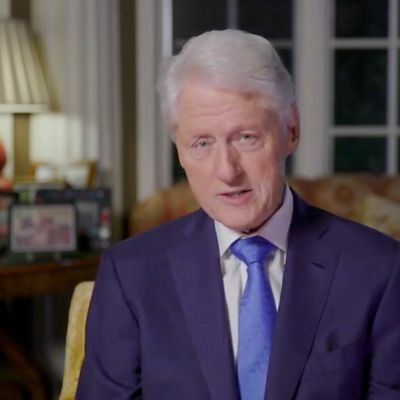
You’d probably have to go back to William Jennings Bryan to find a politician as closely identified with multiple national party convention addresses as William Jefferson Clinton. But this year, for the first time, Bill Clinton’s convention appearance seemed deliberately diminished, and perhaps even an obligation offered with clenched teeth. Identified with bad male behavior and outworn ideology, he was consigned to a lesser role than any he has ever had since 1988.
Clinton spoke in the first, non-featured hour of the proceedings, in a segment entitled “leading from the Oval Office,” along with Jimmy and Rosalynn Carter and a daughter and grandson of John F. Kennedy. John Kerry has a significantly more prominent place on the schedule, as does 30-year-old political comet Alexandria Ocasio-Cortez. The famously long-winded Clinton was given less than five minutes to speak, and it’s very likely he was handed talking points, if not a text. It’s an ignominious placement for a two-term president.
His first big convention effort was a actually a big mistake: a 1988 nominating speech for Mike Dukakis that went so far overtime that when he said “in conclusion,” the audience cheered. His two convention speeches as party nominee nicely encapsulated the messages he convinced Democrats to embrace, from 1992’s values-talk of “opportunity, responsibility, and community” on behalf of “the forgotten middle class,” to 1996’s pledge to “build a bridge to the 21st century.”
But it has been as a lame duck and then as an ex-president that Clinton has truly excelled as a convention star. In 2000, he brought delegates to their feet again and again as he touted the policy accomplishments of his administration that Al Gore had shirked in his fear of being tied to the Lewinsky scandal. In 2004 he was given a rare exemption from that convention’s rule against direct criticism of Republicans in a speech trashing the damage that George W. Bush’s presidency was doing to his legacy. In 2008 he contributed greatly to party unity (which he had himself damaged while promoting his wife’s presidential nomination bid) with a speech symbolically passing the torch of party leadership to Barack Obama. And then in 2012 he delivered the speech making the case for Obama’s reelection that led the latter to joke that he should name his predecessor “secretary for Explaining Stuff.”
In 2016, Bill Clinton had the complicated task of speaking on behalf of his charisma-challenged wife, magnifying her political gifts and her own record without overshadowing or undermining her. By most accounts he succeeded.
This year there are two obvious reasons for this very deliberate decision to leash the Big Dog in a backyard of the convention proceedings. Most obviously, he has been linked to increasingly credible allegations of sexual assault and even rape that are being revisited in the new climate introduced by the Me Too movement. This serious shadow over his reputation and legacy is being reinforced anew by fresh images of him in the entourage of the late sex trafficker and pedophile Jeffrey Epstein.
The devolution of Clinton into something approaching a political pariah for his conduct toward women has been accompanied by a steadily deteriorating ideological reputation. His trade and crime policies are being regularly denounced by Republicans and Democrats alike, and Joe Biden in particularly needs to keep them out of sight and mind. More generally, the emerging progressive wing of the Democratic Party with whom Biden and Kamala Harris need to keep the peace through November and beyond loathes the centrist New Democrat heritage Clinton left as a matter of quasi-religious conviction. All in all, it’s fortunate this is a virtual convention because Bill Clinton would likely have drawn lusty boos in a real one with hundreds of Bernie Sanders delegates in the house.
On Tuesday night, Clinton looked pretty hale and hardy, though his voice was raspy. For those who remember him as a speaker who was as good a speechwriter as any of his ghosts, you’d like to believe he personally drafted the anti-Trump zingers that drew appreciative chuckles everywhere:
Much of Clinton’s speech, however, was boilerplate Biden-Harris campaign rhetoric. It’s understandable that the party did not call on Clinton’s special rhetorical talents in this perilous year when Democrats don’t need much encouragement to gird up their loins for November — and were given all they needed by Michelle Obama last night. Perhaps by 2024, Bill Clinton will have fully drifted into the ranks of ex-presidents, and will no longer be a source of current controversy. But in his time, he could make a speech like nobody else.






























